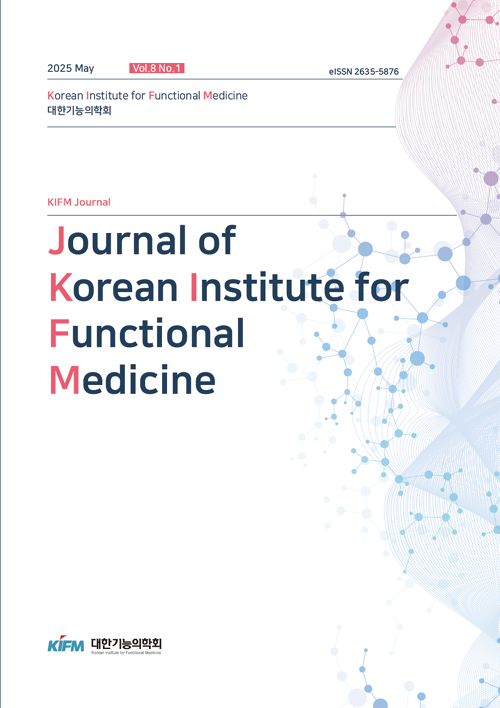만성질환 및 퇴행성 뇌질환에 대한 당독소의 이해 및 치료적 접근
Understanding and therapeutic approaches to advanced glycation end-products in chronic diseases and neurodegenerative diseases
- 대한기능의학회
- Journal of Korean Institute for Functional Medicine
- Vol.8 No. 1
-
2025.0520 - 32 (13 pages)
-
DOI : 10.32581/jkifm.2025.8.1.20
- 9

비효소적 당화과정을 통해 형성되는 최종당화산물(AGEs)은 신체에 축적되어 만성 퇴행성질환과 관련 합병증, 특히 당뇨병성 합병증, 만성 신장 질환, 비알코올성 지방간 질환 및 알츠하이머병과 파킨슨병의 신경 퇴행성 질환을 유발하는데 매우 중요한 역할을 담당한다. AGEs는 단백질 변성을 통해 단백질의 물리적, 화학적 특성을 변화시킬 수 있으며 최종당화산물 수용체(RAGE)를 통해서 작용할 수 있다. 그렇기 때문에 AGEs로부터 기인하는 독성신호의 시발점이 되는 최종당화산물 수용체(RAGE) 역시 각 질병의 예방 및 치료를 위한 중요한 요소이다. 기능의학적 관점에서 식생활 및 식이습관과 밀접한 관계가 있는 AGE와 각 질병에 대한 관계를 이해하고 AGEs-RAGE 상호 작용 및 형성을 제어하는 전략은 만성질환, 퇴행성뇌질환을 예방하고 치료하는 데에 도움이 될 수 있다.
Advanced glycation end products (AGEs), which are formed through nonenzymatic glycation, accumulate in the body and play a very important role in causing chronic, degenerative diseases and related complications, especially diabetic complications, chronic kidney disease, nonalcoholic fatty liver disease, and neurodegenerative disease such as Alzheimer's disease and Parkinson's disease. AGEs can modify proteins and change their physical and chemical properties and can act also via specific receptors, among them receptors for advanced glycation end products (RAGE) is the best known. RAGE, a starting point of toxic signals from AGEs, is also an important factor for the prevention and treatment of each disease. From a functional medicine perspective, understanding the relationship between AGEs, which are closely related to diet and dietary habits, and each disease and strategies to control the interaction and formation of AGEs-RAGE can be helpful in the prevention and treatment of chronic diseases and neurodegenerative diseases.
서론
본론
결론
References
(0)
(0)